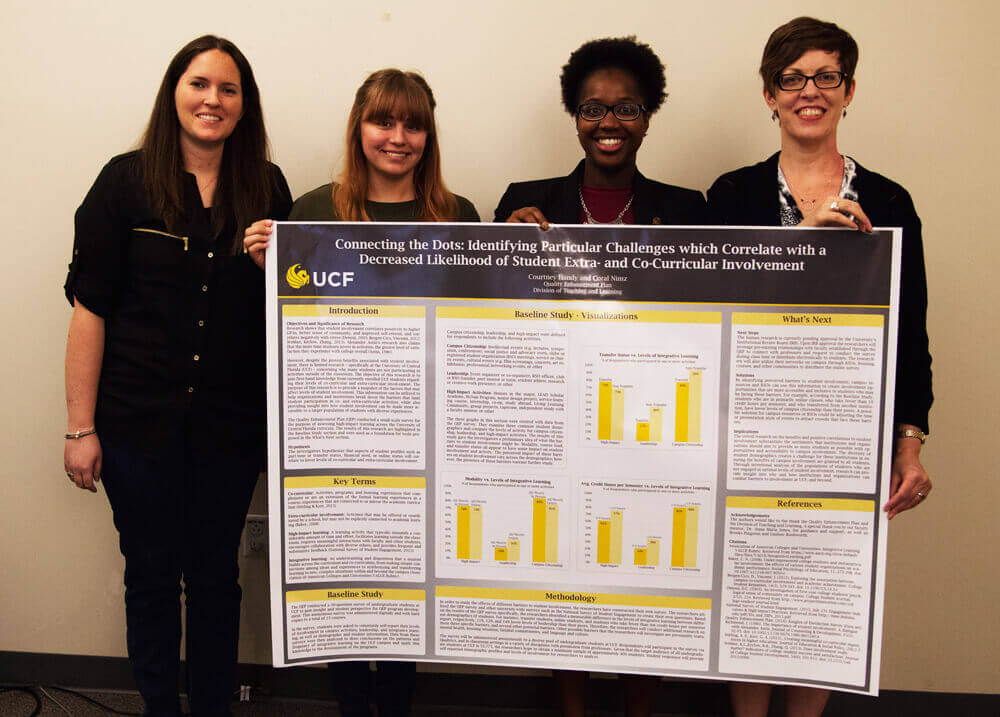This year, What’s Next Student Fellows, Courtney Handy and Coral Nimz not only helped us develop programming and resources for integrative learning, they also conducted their own research project, “Connecting the Dots: Identifying Particular Challenges which Correlate with a Decreased Likelihood of Student Extra- and Co-Curricular Involvement,” which they presented at the 2017 UCF Showcase of Undergraduate Research Excellence (SURE). We asked them to talk a little about themselves and about their project.

Coral and Courtney display their poster with Dr. Anna Maria Jones and Lindsay Rushworth.
What’s your major?
Coral: I am majoring in Mathematics with a minor in Studio Art.
Courtney: I am majoring in Legal Studies with a minor in Sociology.
How did you choose your research topic?
We knew that we wanted to research something that was related to integrative learning and student involvement. We were both very active in campus involvement throughout our time at UCF. While discussing possible options, we realized that both of us had a very similar experience: we tended to see the same few faces in all of the organizations in which we were involved. We began to wonder why this was the case. Why were some students more predisposed to being involved? Was there a population of students that was missing out on these opportunities? Since Courtney and I both valued our involvement and leadership experiences so greatly, we wanted to find out who those populations of students were, so that they could be more included in the future. This led to the selection of our research topic, identifying perceived barriers which correlate to a decreased likelihood of extra- and co-curricular involvement.
Do you plan to keep working on this project? If so, what are the next steps/what do you want to do with it?
We are currently waiting for IRB approval, but as soon as that comes through we will start the research process and start reaching out to students.
What challenges did you encounter during this process, and how did you overcome them?
The primary challenge we faced during the research process was the pending IRB approval. We were unable to secure approval to begin conducting the main part of the research prior to our presentation at the Showcase of Undergraduate Research Excellence. We overcame this challenge with the help of our faculty mentor and others who guided us in redirecting the data used, while maintaining the general focus of the project. We were able to use existing data as a baseline for our research until we can conduct further studies.
What do you think is the most valuable skill/lesson that you took away from participating in undergraduate research?
Coral: The most valuable lesson I learned from this experience is that there are still so many questions out there to answer. As a Math major, I always shied away from undergraduate research because I found it big and intimidating. Being involved in a project like this has given me the confidence to realize that research is for anyone.
Courtney: The most valuable skill I gained from undergraduate research was the ability to be flexible. As a Legal Studies major, I was not familiar with this form of research. However, I utilized resources to step out of my comfort zone and adapt to be successful in conducting and presenting the research.
What is one piece of advice that you would offer to students who are thinking about participating in undergraduate research?
Coral: Give yourself plenty of time! Many of the steps that I thought would be quick and easy ended up being the steps that held us back the most. If we had taken more initiative earlier in the year, we could have been much further in our research. Similarly, don’t wait until your senior year to get involved in undergraduate research. If you wait too long, you may miss out on opportunities you never knew existed.
Courtney: My piece of advice for students would be to stay open-minded throughout the research process. There may be times when your research may lead you in a different direction or adjustments to your original plan may be needed. If you maintain an open mind, then these changes will be smoother and the experience will be less stressful overall.
What do you plan to do when you graduate?
Coral: When I graduate, I hope to enter the work force doing data analysis. My experience with undergraduate research and analyzing data for our project will give me the skills I need to set me apart from my peers.
Courtney: I will begin law school at the University of Florida Levin College of Law in the fall of 2017!